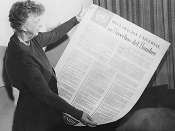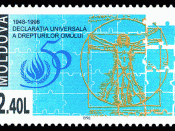The Universal Declaration of human Rights shares a lot in common with the Ugandan constitution. "The 1995 constitution gives hope for enjoyment of Human Rights and governance compared to its predicessors"1 Below is a survey into the relationship between the two documents. It should be noted however that there are both similarities and differences. Many Ugandan laws, as well as some sections in the Constitution, contravene the provisions of the international human rights treaties to which the country is a party, and have been used by the authorities to restrict fundamental freedoms.
Livingstone Sewantaya contends that the Universal Declaration of Human Rights permeates national constitutions in Africa,
"Its most fundamental achievement achievement remains the setting of international standards which have influenced legislation, incorporation of charters, ressoulutions and the development of an international Human Rights Regime. It has projected its self into domestic law of states and its norms find expression in national constitutions of states including Uganda" 2
It is in this spirit that chapter 4 of the 1995 constitution which contains the bill of rights entitled "protection and promotion of fundamental and other Human Rights and freedoms'is modelled on the foundation of the Universal Declaration of Human Rights. The preamble of the 1995 Uganda constitution commits Ugandans to: "Building a better future by establishing a social economic and political order through a popular and durable national constitution based on the principles of unity, peace, equality freedom, social justice and progress"
The first paragraph of the Universal Declaration of Human Rights in the preamble spells out a direct relationship with article 20 of Uganda's 1995 constitution. Both show that Human rights are inherent. "Whereas recognition of the inherent dignity and of the equal and inalienable rights of all members of the human family is the foundation of freedom,


